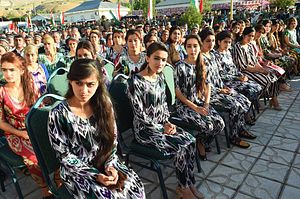A few weeks after Tajik President Emomali Rahmon commemorated the 10th anniversary of the state’s law on rituals and traditions — which, among other things banned big wedding parties and legally restricted birthdays to in-house affairs — Dushanbe has set up a commission to promote appropriately “Tajik” clothing and combat the influence of “alien” cultures.
RFE/RL reported last week that the commission, headed by Culture Minister Shamsuddin Omurbekzoda, will “help design clothes for men and women.” Omurbekzoda told reporters that the commission would taking “Tajik traditions” and “modern” life into consideration.
The minister also had some odd comments that bolder the perception that this focus on highlighting “Tajik culture” is a thin disguise for the state’s continued crackdown on expressions of Islam, particularly anything that seems “Arab.”
Absurdly, Omurbekzoda said that the hijab isn’t compatible, hygienically, with Tajikistan’s “hot climate” and that women donning the headscarf could generate “fear and doubt” in public settings. “Some people standing next to them might wonder, ‘What if she is hiding something under her hijab,” Omurbekzoda said.
Nevermind that the average July high in Dushanbe is 97 degrees Fahrenheit while in Riyadh, the capital of Saudi Arabia where women don’t just don a scarf but a full-body black abaya when in public, the July average high is 111 degrees. And chances are that a woman is indeed hiding something under her hijab: a head of hair.
Interestingly, back in 2012 there was a flash of rash cases in Kulob, allegedly attributed to synthetic Chinese-made hijabs. More expensive Turkish-made cotton hijabs didn’t sell as well, a merchant told RFE/RL.
Ultimately, hygiene isn’t the issue (though the economic realities that lead to buying cheap clothing may be) and the fear which the minister references isn’t of what is under the hijab but what exists in the mind of the individual. By focusing on the physical manifestations of faith — as if there were a direct line from beards and hijabs to extremism — Dushanbe isn’t doing itself any favors in actually combating extremism. By forcing the pious to the margins, Dushanbe is doing little more than making such populations more susceptible to recruitment.
What exactly the commission will accomplish is unclear. Tajik authorities have, for years, been sidelining Islamic dress — banning hijabs from government buildings and schools, for example — and occasionally forcing men to shave beards deemed too extreme. Rahmon routinely rages against non-Tajik clothing. As I wrote earlier this month, “The government may try to distinguish between good and bad Islam and Tajik and non-Tajik practices, but decrees do not make culture, people do.”
Thankfully, as the American inventor Charles Franklin Kettering reportedly said, “If you want to kill any idea in the world today, get a committee working on it.”
































